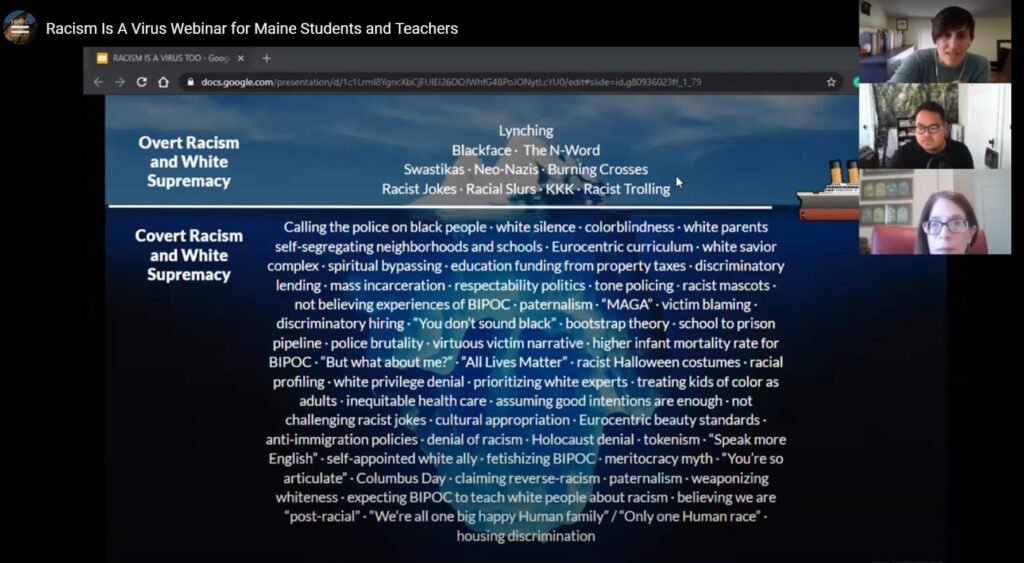Per Breitbart, Using the slogan “MAGA” is an example of covert racism and white supremacy, according to an instructional video available through Maine’s Department of Education.
The video, found in a publicly accessible slideshow about what makes communities “welcoming and inclusive,” also lists a stunning variety of examples of covert racism and white supremacy in addition to “MAGA,” the tagline of former President Donald Trump’s successful 2016 presidential campaign.
“Calling the police on black people,” “white silence,” “colorblindness,” “mass incarceration,” “all lives matter,” “white privilege denial,” “anti-immigration policies,” “meritocracy myth,” “claiming reverse racism,” and “paternalism,” are among the dozens of examples listed in the video.
The video comes as part of a slideshow, or “module,” recommended by the state Education Department’s Maine Online Opportunities for Sustained Education (MOOSE) for high school-aged students. The video, titled “Racism is a Virus,” is found on slide 19 of the module.
A screenshot from the video is below:

Slide 15 of the module offers resources for students, which includes only a few links, two of them being to Black Lives Matter’s and GLAAD’s websites.
Slide 5 of the module offers a welcome message from one of the module creators, Katie Lutts. Lutts, whose LinkedIn states she is a 9th grade health teacher in York, Maine, also appears to have a Twitter account in which she liked several tweets in 2019 from prominent Democrats, including from then-Sen. Kamala Harris (D-CA) and Rep. Alexandria Ocasio-Cortez (D-NY).
“The president is racist. And that should make you uncomfortable,” reads a tweet by Ocasio-Cortez that Lutts liked. Lutts also liked a tweet from Rep. Katie Porter (D-CA) callingRoe v. Wade “reproductive justice” and an “economic imperative,” a tweet from Harris praisingRoe, a tweet from Harris criticizing the border wall, a tweet blasting Trump’s “bigoted desire to keep brown and Black people out of the U.S.,” and more.
MOOSE provides another module to high schoolers that includes a video called “Root Cause,” which teaches about “power, privilege, and oppression.” The video notes, “Examples of privileged identities: white, male, cisgender, heterosexual, wealthy.”
“You could be talking about how white people have power over people of color, and it’s important to know that this is a system set up intentionally to deny people equal access to opportunities,” instructor Andrea Levinsky, who works for Portland Public Schools, says in the video.
Levinsky notes, “I also wanted to add that you don’t need all of the privileged identities to have privilege. So, for example, I’m white, so I have white privilege, but I’m also a woman, so I don’t experience privilege with being a woman.”
MOOSE offers numerous modules as part of Gov. Janet Mills’ (D) taxpayer-funded education plan introduced in September 2021. Mills noted at the time of the plan rollout that MOOSE was designed to address “the academic impact of lost instructional time” after the Democrat governor recommended shutting down in-person learning in schools for months in 2020 as a response to coronavirus case surges.
Mills praised the education plan — paid for by President Joe Biden’s “American Rescue Plan” and approved by the federal government — in a statement, saying it was a “welcome step” toward returning to in-person learning.
Mills is facing former Gov. Paul LePage (R) in a tight gubernatorial race this year, and the Maine Republican Party has repeatedly criticized Mills amid her bid for reelection for her approach to education policy.
The group launched a statewide television and radio ad campaign in May blasting Mills for “radical school lessons” after a MOOSE module designed for kindergarteners was found to be featuring a video about transgenderism and gay relationships.
The Education Department quickly removed the video, according to the Portland Press Herald, and a Mills spokeswoman told the outlet, “The governor was not aware of the lesson, but she understands the concerns expressed about the age appropriateness, and agrees with the Department of Education’s decision to remove the lesson.”
Neither Mills’ office nor the state Education Department responded to requests for comment about the new module discoveries.







